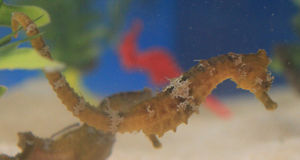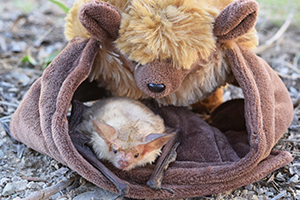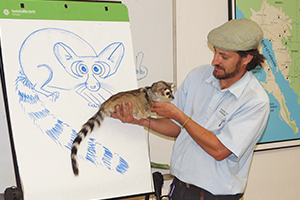
Saltwater Gallery - Species
- Other Species
- Pacific boxfish (Ostracion meleagris)
- Longnose butterflyfish (Forcipiger flavissimus)
- Guineafowl puffer (Arothron meleagris)
- Spotted sharpnose puffer (Canthigaster punctatissima)
- Spotted garden eel (Heteroconger hassi)
- Longnose hawkfish (Oxycirrhites typus)
- King angelfish (Holacanthus passer)
- Scrawled filefish (Aluterus scriptus)
- Black triggerfish (Melichthys niger)
- Rockmover wrasse (Novaculichthys taeniourus)
- Blue-spotted jawfish (Opistognathus rosenblatti)
- Popeye catalufa (Pristigenys serrula)
- Tailspot cardinalfish (Apogon dovii)
- Bigscale soldierfish (Myripristis berndti)
- Frogfish (Antennarius sp.)
- Scorpionfish (Scorpaena mystes)
- Balloonfish (Diodon holocanthus)
- Starry moray (Echidna nebulosa)
- Jewel moray (Muraena lentiginosa)
- Zebra moray (Gymnomuraena zebra)
- Mexican lookdown (Selene brevoortii)
- Cortez angelfish (Pomacanthus zonipectus)
- Pacific creole (Paranthias colonus)
- Coral hawkfish (Cirrhitichthys oxycephalus)
- Sunset wrasse (Thalassoma lutescens)
- Cortez rainbow wrasse (Thalassoma lucasanum)
- Achilles tang (Acanthurus achilles)
- Barberfish (Johnrandallia nigrirostris)
- Convict surgeonfish (Acantghurus triostegus)
- Yellowtail surgeonfish (Prionurus punctatus)
- Whitecheek surgeonfish (Acanthurus nigricans)
- Threebanded butterflyfish (Chaetodon humeralus)
- Moorish Idol (Zanclus cornutus)
Species Spotlight: Sea of Cortez
-
Pacific Seahorse (Hippocampus ingens)

Photo © Liz Kemp - The Pacific Seahorse is the only type of seahorse found in the Gulf of California. It is one of the largest species, growing up to a foot in length. Living among corals, sea fans, sea whips, and sea grasses, they can live up to 4-6 years. They don't swim very well and can die from exhaustion in high currents, which can result from severe weather. They swim upright, which is very different from other aquatic life. Even though it may appear otherwise, they lack scales. Seahorses have a small crown on them called a coral net, which varies from individual to individual. Seahorses have neither teeth nor stomach. Thus, they swallow food whole and have to eat constantly due to the fast process of digestion.
- California Sea Hare (Aplysia californica)
-
Like our seahorses, these herbivorous marine mollusks are produced through aquaculture. In the wild they are part of the marine coastal community in the Pacific Ocean from northern California to Baja California. Individuals can often be found on their algal food, and aggregate in large numbers near food in the summer months (June - August) when they breed.
The name "sea hare" comes from the sensory tentacles on the top of their head, called rhinophores, which are somewhat reminiscent of rabbit's ears. Unlike other gastropods, sea hares don't have a large external shell in which to retreat. Instead, they have a small, flat, vestigial shell, the consistency of cardboard, covering the viscera and nominally protecting the heart and other internal organs.
More than just an ocean oddity, sea hares have the potential of benefitting humankind. IN 2000, Dr. Eric Kandel won the Nobel Prize in Physiology or Medicine for research into how neurons form and store memories. For this research, he used neurons from sea hares and mice. Other studies of sea hares have led to drugs now in clinical trials aimed at reversing memory loss in patients with degenerative mental diseases. In other words, drugs currently being tested to reverse Parkinson's disease and Alzheimer's have been developed thanks to the humble California Sea Hare!










